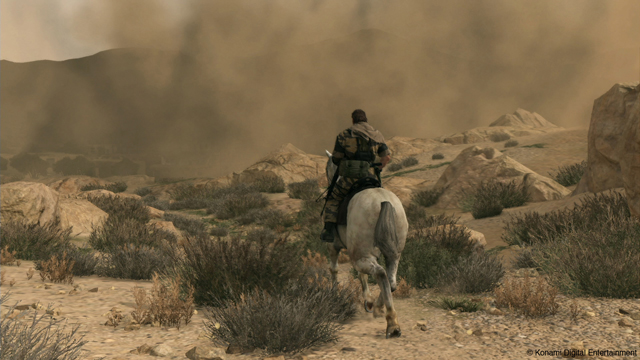Snake shows off his wild side.
The announcement that Snake's new moniker would be Venom Snake came in the form of a poster on the walls of the line to see a live demo of Metal Gear Solid V: The Phantom Pain. It was one of a series that showed the evolution of Snake's design (using the original sprites from Metal Gear and Metal Gear 2: Solid Snake up to the high-def render of the shrapnel horned post-coma soldier of The Phantom Pain).
Once seated inside, we were treated to the same trailer that played at E3, before Kojima Productions devs Sean Eyestone and Jackie Tan launched into the game itself, where Ocelot (Troy Baker) gave Snake (Kiefer Sutherland) the mission to track down and rescue his former second in command, Kazuhira "Master" Miller (Robin Atkin Downes), captured in the Russian-occupied Afghanistan of 1984. With regard to his performance, Sutherland had already started to grow on fans in Metal Gear Solid V: Ground Zeroes and Baker manages to perfectly capture a middle aged and graying Ocelot transitioning from the young Russian double agent of Metal Gear Solid 3: Snake Eater (set in 1964) to the raspy cowboy of Metal Gear Solid (set in 2005).
In order to track down Miller, it was necessary to locate a captured soldier in a nearby town. Kojima has made claims that this Metal Gear would be darker and more serious than those of the past. While this might be true of the story, Eyestone and Tan quickly established that this new Metal Gear had no shyness regarding humor in gameplay. This became incredibly clear when, after taking down a pair of soldiers with tranquilzer darts and close-quarters combat, Snake attached a balloon to them so they could be extracted and taken back to Mother Base, recruited to serve in Snake's private army. As Snake attached a balloon to each of them and they floated up, they began to squawk comically (if still conscious) only to cry out in alarm as they were airlifted out with the Fulton Recover System.
However, Snake wasn't limited to just using this system on people. In short order he shot and recovered a sheep, and then a jeep, and a shipping container filled with supplies. Eyestone was careful to note that you wanted to be sure you got out of the jeep or container, because you could accidentally abort a mission that way. Eyestone and Tan recovered almost anyone they shot or anything that couldn't be tied down, though they had to move someone outside, and mentioned that using the recovery system during a sandstorm (which Snake weathered with very low visibility) could blow the object or person being recovered into a cliffside or other environmental barrier, potentially killing or destroy the cargo.
Unsatisfied with the cover, having arrived at the complex where the soldier was being held, Eyestone and Tan had Snake call in a support drop; a cardboard box. The box worked the way it traditionally had in Metal Gear games, but with some new mechanics. Snake could pop out of the top of the box to fire on an enemy or use CQC. Additionally if the box was spotted moving and there was cover nearby, Snake could dive out of one end of the box and crawl away, using the box as a distraction to lure in enemies and take them out.
Additionally, Snake's new prosthetic arm allowed him to distract guards by making a mechanical knocking sound with it, meaning he didn't need a wall to tap to create a distraction. Right around this point, the developers showed how Snake's ability to move from cover and shoot worked in the current build. In another silly use of Snake's abilities, they called in an equipment drop on top of an enemy position where it dropped on his head and knocked him out. These and other techniques allowed Snake to hone in on the captured soldier. In a gag similar to Kojima's cameo in Ground Zeroes, it turned out to be demo driver Jackie Tan, whom Snake recovered after looking at nearby intel.
Following the captured soldier's recovery, Eyestone and Tan let Snake be seen so they could show off both his combat abilities outside of stealth and the choices for air support. Making short work of several enemy combatants, they had Snake dash away in a nearby jeep and called in an airstrike on his current position with helicopter extraction afterward. As Snake drove away, Tan and Eyestone had Snake look back, so we could the bombs hit the tiny village, setting it ablaze and destroying the evidence of what was there.

This ended the first part of the demo. What came next was a short illustration of how Mother Base works in The Phantom Pain. Confirming what had been suggested by the P.O.W. recovery elements of Ground Zeroes, this part of the game is very similar to Metal Gear Solid: Peace Walker, except that in Phantom Pain you custom build it. Mother Base is, as in Peace Walker, built up from a series of hexagonal oil rigs that can be placed next to each other, or bridged by small gaps.
Everything that you recover will be there (including the sheep, jeep, shipping container, and the soldiers) and adds to the personnel and equipment stores. Eyestone pointed towards drones and anti-aircraft guns on the decks of Mother Base and there was a tank conspicuously in view showing what had either been recovered or bought with in-game currency. Upon arriving, all the soldiers saluted Snake and the recovered in-game Tan thanked Snake for coming to his rescue.

At one point earlier in the demo, Snake called in to Mother Base and assigned a person who had been recovered to the intel team in order to check out the area where Snake was going to be sneaking. This allowed Snake to know where enemy movements would be concentrated, so he could check there and tag potential enemies with his binoculars. The second reason is that the more aggressively you play as Snake, the more enemies you make; they can and will attack Mother Base, requiring you and your soldiers to work to defend it.
Visually, The Phantom Pain's rocky Afghanistan vistas look excellent and in the demo it was running at 1080p and 60 FPS off of PS4. There was a good chance to look at Snake more in-depth while he smoked an e-cigar (complete with holographic smoke) as a method of passing time between day and night. Visually not a whole lot has changed since Ground Zeroes, with some of the same drop-in and the edges of assets fading in or out, but the general scope was very impressive.
The demo featured a sense of humor and the return of many of Snake's abilities that fans lamented were lacking in the very dour Ground Zeroes. In short, Metal Gear Solid V: The Phantom Pain appears to be Metal Gear Solid through and through, but with a great deal more choice in how you choose to approach every aspect than any previous game in the series. One thing is certain about Metal Gear Solid V: The Phantom Pain… it's gonna be a helluva ride.







